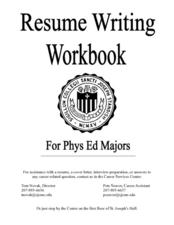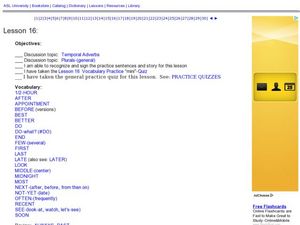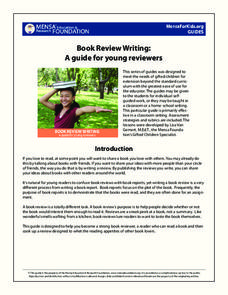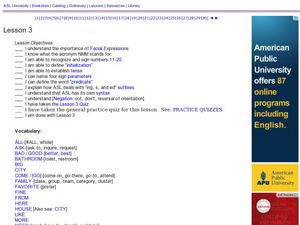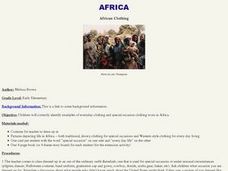Modified Language Arts Teacher Resources
Find Modified Language Arts lesson plans and worksheets
Showing 102 resources
Curated OER
ASL Lesson 8
Another awesome ASL activity! Teach ASL to a special ed class, hearing impaired child, or for your own enrichment. This activity provides comprehensible ASL language development. Each highlighted blue area links to a video, printable...
Curated OER
Learning ASL: Lesson 9
Here is activity 9 in an extensive series on teaching and learning ASL. Discuss code switching, numerical incorporation, and noun based vocabulary. Then, click on the blue links to view ASL in action. Each link takes you to a printable...
Curated OER
Speech/Language Scavenger Hunt
A good idea. To build both speech and social skills special ed students go on a scavenger hunt. They locate people around the school and say a series of words, when they say the words correctly they receive a prize. They also ask for...
Curated OER
A Historical and Educational Perspective on American Sign Language
Using Sign Language to Communicate with Your Special-Needs Students in the Classroom
Teaching Channel
Florida School for the Deaf and Blind
Learn from teachers at the Florida School for the Deaf and Blind on ways to reach students of different learning styles and ability levels, as well as how to accommodate learners with special needs in a general education classroom setting.
Amoeba Sisters
Specialized Cells: Significance and Examples
All cells are created equal, but some go on to do amazing things! Find out more about these super hero cells with a short video from a well-written biology playlist. Topics include specialized plant and animal cells and how cells know to...
Amoeba Sisters
How Cells Become Specialized
Cell specialization is amazing! How do they know what they should become? A video from an interesting biology playlist examines the process of cell specialization. Content includes where we find specialized cells, types of specialized...
Curated OER
Shakespearean Dating Tips
Want to get the attention of that special someone? Try out some metaphors! This colorfully animated video first points out the positives of Shakespeare’s works, before comparing complex metaphors about love to modern pick-up lines. The...
Curated OER
ASL: Lesson 19
Being able to express feelings is important for every learner. ASL lesson 19 is intended for teaching hearing impaired pupils or special ed teachers functional ASL. Since this provides a list of signs describing feelings, it would be a...
Teaching Channel
Building Analysis Skills Through Art
Useful teaching strategies abound in this inspirational, informative video! Walk step by step through one teacher's two-part lesson in her special education/ELL class as they develop text analysis skills by first beginning with analyzing...
Curated OER
Resume Writing Workbook for Phys Ed Majors
Although labeled for Phys Ed majors, the advice and information in this workbook could apply to a job search in any field. The section detailing the purpose for and content of a resume is followed by worksheets, a list of resume action...
Curated OER
ASL: Lesson 16
ASL lesson plan 16 covers adverbs of time, sentence structure, and asking questions. Each blue link takes you to an image, instructions, or video of the word/s being signed. Great resource!
TED-Ed
Mysteries of Vernacular: Sarcophagus
Tackling etymology in your language arts or linguistics class? Starting a unit on Egypt or ancient Rome? This video details the grim past of the word sarcophagus, tracking it back to the early Roman empire. Included along with the quick...
TED-Ed
A Brief History of Religion in Art
Did you know that some languages have no word for art? The English language does and the narrator of this short video discusses the aesthetic dimension of religious art as it "visually communicates meaning beyond language."
MENSA Education & Research Foundation
Book Review Writing: a Guide for Young Reviewers
Encourage scholars to share their love of reading with informative and engaging book reviews. Here, you'll find a series of guides that walk learners through the review writing process. Included in the collection is information about...
Curated OER
Mysteries of Vernacular: Robot
Where does the word robot come from? Starting with a brief definition, the video explores the origins of the word, using neat animations to demonstrate the narration. The resource also comes with assessment questions, links to more...
TED-Ed
The Myth of Oisín and the Land of Eternal Youth
Viewers learn about Echtrai, an Irish myth genre, with the retelling of the myth of Oisin and his visit with Niamh to Tir na nOg, the land of eternal youth.
Curated OER
ASL: Lesson 3
The ASL lessons from lifeprint are amazing, but can be complicated. While this lesson is perfect for those needing to learn or teach ASL to the deaf community, it could also provide a valuable communication tool. This resource features...
Curated OER
Figures of Speech: Quiz 2
Hyperbole, simile, metaphor, and personification are spotlighted on an online/interactive quiz. Test takers read short passages and then identify the figures of speech used.
Curated OER
African Clothing
Students explore African clothing. In this African culture social studies lesson, students brainstorm types of clothing they wear for different occasions. Students view photographs of Africans wearing Western clothing and "special...
Curated OER
Photography for Language Use and Awareness
Students make storyboards and take photographs for slides to illustrate stories or "how to" demonstrations and write and recorded scripts to accompany their slides.
TED-Ed
The Chaotic Brilliance of Artist Jean-Michel Basquiat
In 2017 a work by Jean-Michel Basquiat was actioned off for over 110 million dollars. So who is he and what makes his art so special? Find out with a short video that details his background, influences, and his process.
Curated OER
The Brooklyn Museum of Art Newspaper
By working cooperatively, writers will create a newspaper about the Brooklyn Museum of Art. Each member will take on a different role representing various types of newspaper writers. They will discover the history, exhibits, special...
TED-Ed
Why Should You Read Charles Dickens?
Prisons, orphanages, slums, workhouses. Such are the settings of Charles Dickens' novels. Why would anyone (except for literature teachers, perhaps) want to read these tales? Find out why with a short video that explores the allure of...












